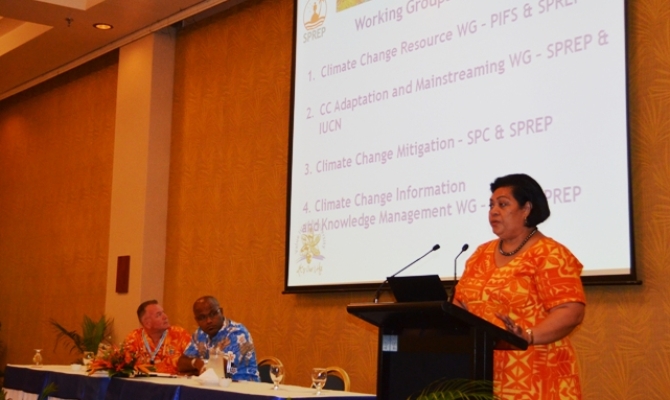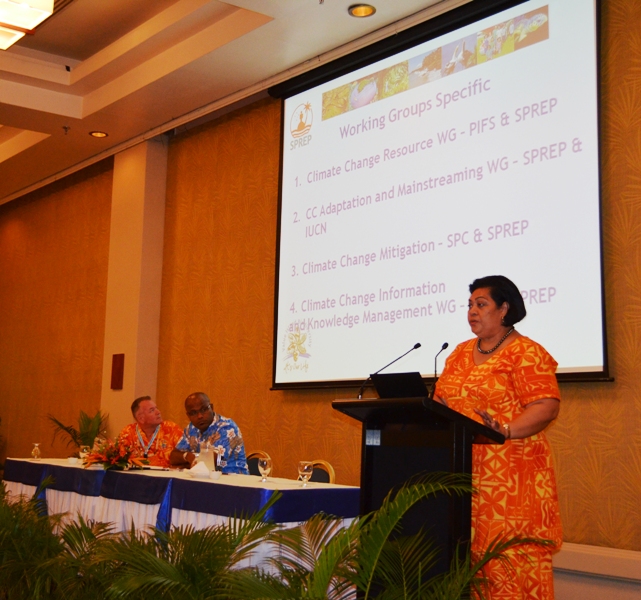
Climate Change Resilience
3 July 2013, Nadi, Fiji - The compilation of a list of regional climate change experts, establishment of a rapid response fund, a regional technical support mechanism, a regional displacement study and a regional climate change communication strategy are some of the recommendations from 2011 Pacific Climate Change Roundtable that have been actioned over the past two years.
The Director of Climate Change at the Secretariat of the Pacific Environment Programme (SPREP), Dr Netatua Pelesikoti, highlighted the progress made since their last PCCR meeting held in Niue in 2011, during the start of sessions at the PCCR in Nadi.

One of the recommendations from 2011 was the creation of a list of climate change experts in the region.
She said PCCR participants of 2011 wanted a roster of experts accessible for when they seek experts in specific areas of climate change to support their national activities. This roster is also available to partners and donors.
An experts list was compiled and is available on the Pacific Climate Change Portal www.pacificclimatechange.net.
In the area of finance, a climate change rapid funds is expected to be started in the third quarter of this year as a pilot.
Dr Pelesikoti said members who wanted funding that could be accessed rapidly could apply to this facility. There will be criteria established for the management of the facility and was not limited to the usual technical assistant or capacity building request but would also include finance advice, policy, project proposal writing, monitoring and evaluation and so forth.
"The current technical assistance provided by the Secretariat of the Pacific Community (SPC), SPREP and the University of South Pacific will not be replaced by this facility."
The other major development that will also take place later this year is a regional wide study on displacement. She said that the UN Economic and Social Commission for Asia and the Pacific is looking at the possibility of doing this study.
Another key issue highlighted during the 2011 roundtable was the need for information and data sharing.
Dr Pelesikoti says some of these concerns have been addressed with the creation of the Pacific Climate Change Portal www.pacificclimatechange.net and the Disaster Net. Although she acknowledged that more work was needed to get national sectors to share data and also the issue of updating information on the national portals.
In the area of climate change mainstreaming, a guideline was developed based on the experiences gained from the Pacific Adaptation to Climate Change (PACC) will be launched during the PCCR. This guideline was a partnership work with the Pacific Adaptation to Climate Change national coordinators, SPREP, SPC, GIZ and UN Development Programme. PACC is funded by the Global Environment Facility and implemented through UNDP.
Dr Pelesikoti says this to ensure that climate change is incorporated into government policies, budgets and operations.
There was a call at the 2011 PCCR for a joint roundtable on disaster management and climate change and that will take place next week as part of a process for the development of the next integrated regional climate change and disaster risk management strategy coordinated by SPREP, SPC and the UN office for Disaster Risk Reduction UNISDR.
Dr Pelesikoti says a recommendation for climate change communications strategy has also been completed with SPREP inviting partners to help implement the strategy.
The Director of Climate Change at the Secretariat of the Pacific Environment Programme (SPREP), Dr Netatua Pelesikoti, highlighted the progress made since their last PCCR meeting held in Niue in 2011, during the start of sessions at the PCCR in Nadi.

One of the recommendations from 2011 was the creation of a list of climate change experts in the region.
She said PCCR participants of 2011 wanted a roster of experts accessible for when they seek experts in specific areas of climate change to support their national activities. This roster is also available to partners and donors.
An experts list was compiled and is available on the Pacific Climate Change Portal www.pacificclimatechange.net.
In the area of finance, a climate change rapid funds is expected to be started in the third quarter of this year as a pilot.
Dr Pelesikoti said members who wanted funding that could be accessed rapidly could apply to this facility. There will be criteria established for the management of the facility and was not limited to the usual technical assistant or capacity building request but would also include finance advice, policy, project proposal writing, monitoring and evaluation and so forth.
"The current technical assistance provided by the Secretariat of the Pacific Community (SPC), SPREP and the University of South Pacific will not be replaced by this facility."
The other major development that will also take place later this year is a regional wide study on displacement. She said that the UN Economic and Social Commission for Asia and the Pacific is looking at the possibility of doing this study.
Another key issue highlighted during the 2011 roundtable was the need for information and data sharing.
Dr Pelesikoti says some of these concerns have been addressed with the creation of the Pacific Climate Change Portal www.pacificclimatechange.net and the Disaster Net. Although she acknowledged that more work was needed to get national sectors to share data and also the issue of updating information on the national portals.
In the area of climate change mainstreaming, a guideline was developed based on the experiences gained from the Pacific Adaptation to Climate Change (PACC) will be launched during the PCCR. This guideline was a partnership work with the Pacific Adaptation to Climate Change national coordinators, SPREP, SPC, GIZ and UN Development Programme. PACC is funded by the Global Environment Facility and implemented through UNDP.
Dr Pelesikoti says this to ensure that climate change is incorporated into government policies, budgets and operations.
There was a call at the 2011 PCCR for a joint roundtable on disaster management and climate change and that will take place next week as part of a process for the development of the next integrated regional climate change and disaster risk management strategy coordinated by SPREP, SPC and the UN office for Disaster Risk Reduction UNISDR.
Dr Pelesikoti says a recommendation for climate change communications strategy has also been completed with SPREP inviting partners to help implement the strategy.